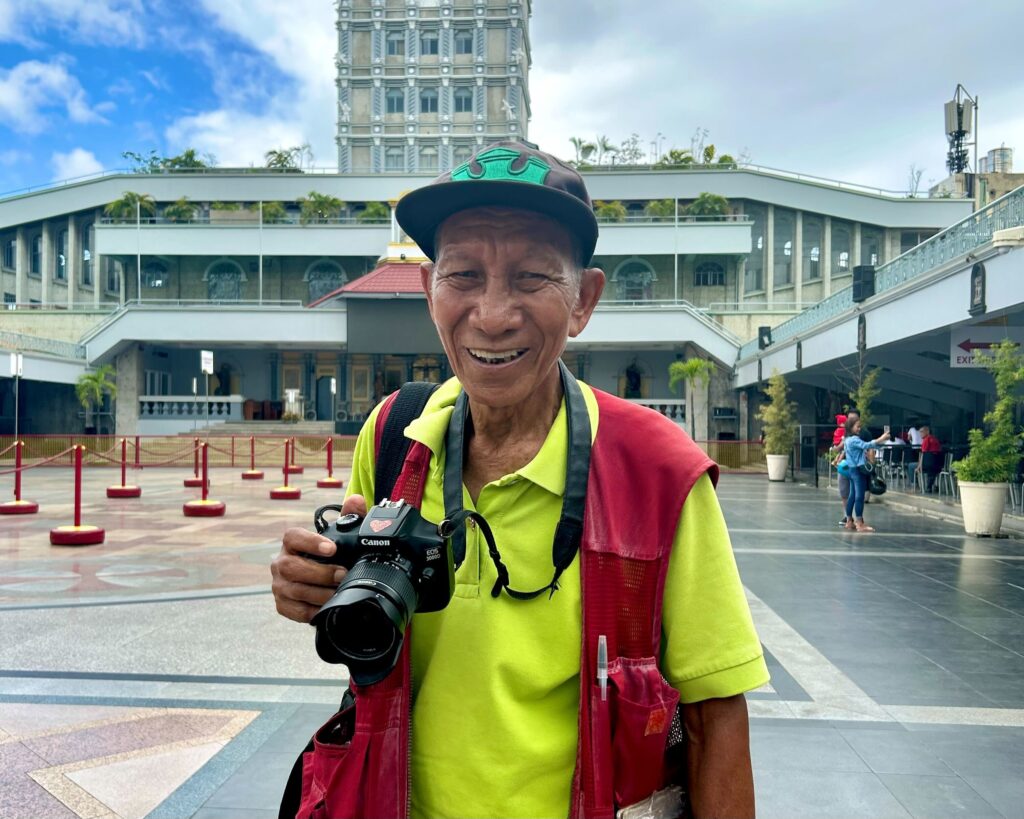
Raised in Zamboanga City in Mindanao, the 84-year-old Noe Salvador found his comfort in the island of Cebu because of his passion for photography. | CDN File photo/Niña Mae Oliverio
CEBU CITY, Philippines — Where does your passion take you?
Embarking on a journey driven by passion, Noe Salvador, an 84-year-old native of Mindanao, discovered his purpose and found his comfort in the picturesque island of Cebu, all thanks to his unwavering love for photography.
Salvador is one of the photographers (locally known as “maniniyot”) inside the compound of Basilica Minore del Santo Niño de Cebu for over 60 years, capturing the essence of life, culture, and spirituality through his lens.
Before making Cebu his home in 1965, he was a photographer for four years in Mindanao, with his lens navigating Lanao del Norte and del Sur, the bustling cities of Iligan, Cagayan de Oro, and Butuan, and the cultural hubs of Cotabato City and Zamboanga. During this period, he held the esteemed position of the official photographer for Southern Mindanao Colleges in Pagadian City, Zamboanga del Sur.
READ MORE: Cebuano student showcases photography skills in Japan
But when his friend told him about the beauty of Cebu and the opportunities he could get here, that redirected Salvador’s lens towards Cebu. Drawn by the allure of the island’s beauty and the promising opportunities it held for a passionate photographer, he decided to embark on a new chapter in his photographic journey.
Noe Salvador posed for a photo while riding a motorcycle in Fort San Pedro around 1970s.
He first started taking pictures at the Cebu Metropolitan Cathedral in 1965, and later transferred to the Basilica.
Getting official
When he transferred to the Basilica, he encountered a unique challenge—photographers were not allowed inside the church then. But when the late actress Gloria Sevilla visited the Basilica, the priests called him to take their photos. However, a turn of events occurred when the late actress Gloria Sevilla visited the Basilica, and the priests called him to take their photos.
“Abogon man sa gwardya og mangodak kon dunay lain nga photographer, pero ako dili ko niya abogon kay gipatawag naman ko sa pari didto,” he said.
Since then, the priests gave him permission to take photos within the halls of the church.
Beyond the church, Salvador’s photographic prowess attracted the attention of various government agencies, leading to requests for his service.
Noe Salvador (right) | Photo taken around 90s when Salvador was hired by the Philippine Air Force in Mactan.
Before, when the photos were still in black and white quality, he sold them at a modest P10 per copy. But when he got into the advent of colored photography, he adjusted the value of his art, pricing each at a more lucrative P50 per copy.
Presently, Salvador is able to capture approximately 20 shots each day, translating into a daily income of around P1,000.
In the 1980s, he was able to invest in a lot in Barangay Labangon, Cebu City. Salvador shared that he was able to support his three children to college who then successfully earned their degrees.
Recounting his journey, Salvador proudly shared that he was able to support his three children to college who then successfully earned their degrees.
Love for photography
Salvador recalled that it was in his 20s when he started loving photography after his late teacher Irving Camacho enrolled him in a training handled by the American School of Photography.
After training for three years, Camacho, recognizing Salvador’s potential, generously lent him a camera. Armed with a borrowed camera, Salvador embarked on his photographic journey, crafting images that would later define his passion. Eventually, he was able to buy his own camera.
“Mao to’y naka pa inspire sa akoa kay natagaan ko niya’g trabaho aning photography,” Salvador said.
Noe Salvador with Fr. Manuel Fernandez, OSA, taken in 1990s
Technology
As technology evolved, Salvador said that it used to be a little tough for him to develop or print the photos he took because there were no nearby printing shops back then.
“Film pa man to. Dili pariha karon nga naa na may mga studio nga dagko ron ang capital kay computer na man ron. Sauna kami gyud [moadto] sa developing, printing…ang ga-supply sauna, Kodak ra,” he said.
Moreover, he said that back in the 80s, it would take him a week to develop or print the photos–unlike now that the printing shops are just a few steps away from the Basilica and just wait for 15 minutes to have the result.
With the popularity of smartphones now, Salvador said that he does not see it as a threat nor a problem of his work because he firmly believed that no one could beat the quality of a physical photo taken from a digital single-lens reflex (DSLR) camera.
Noe Salvador, portrait photographer
“Puros man naay cellphone (smartphone) akong pang-kodakan pero inigka human nila, manawag man sila [nako] magpa kodak man,” he said.
He emphasized the enduring value of developing and printing photos, noting the unique advantage of preserving treasured memories in physical photo albums—unlike the impermanence of online platforms where photos can be easily deleted or lost.
Salvador reflected on the enriching journey photography has afforded him. Salvador is happy and grateful for pursuing what he really loved because it allowed him to travel to places and meet with people from in and outside the country. The profound joy derived from capturing moments and weaving stories through his lens has not only shaped his life but has also allowed him to traverse landscapes and cultures, creating a tapestry of experiences that he holds dear.
/clo